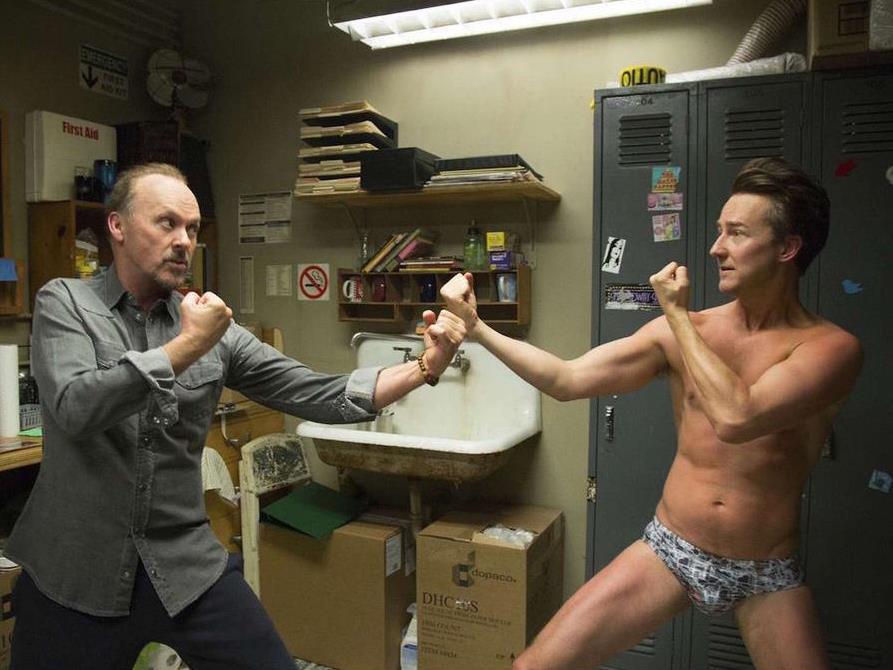Image: supplied
‘That’s good bird, man,’ actor Mike Shiner (Edward Norton, The Grand Budapest Hotel) sneers derisively at his co-star Riggan Thomson (Michael Keaton, Need for Speed) amidst a scene gone wrong, their spat staged for the public to see at a paid Broadway preview. The pair – the former a famed theatre thespian brought in to salvage a small show days before its premiere, and the latter a three-time big-screen superhero now trying to tread the boards back to acceptance – have broken the bounds of their in-play fighting over the topic of authenticity. In Thomson’s adaptation of Raymond Carver’s short story What We Talk About When We Talk About Love, Shiner has taken to swilling real gin; however his erratic, alcohol-fuelled, method portrayal isn’t appreciated by his leading man-cum-director.
Shiner’s chicken-chewing insult name checks not only the film’s title in just one of many of the feature’s self-referential nods and knowing smiles, but the source of Thomson’s insecurities, and the reason this comeback production is considered his lifeline. He’s down but won’t yet allow himself to be out, refusing to be defined by a decades-old popular film franchise and the gruff talking, high flying, telekinetic character at its centre. As his best friend, lawyer and producer Jake (Zach Galifianakis, Muppets Most Wanted) attempts to smooth down the behind-the-scenes messiness, his just-out-of-rehab daughter Sam (Emma Stone, Magic in the Moonlight) hangs around running his errands, and his two actresses – his girlfriend Laura (Andrea Riseborough, Oblivion), and Shiner’s partner Lesley (Naomi Watts, St. Vincent) – sift through their own issues, Thomson tries to retain his sanity and self-respect. Already grappling with the bigger picture of his life and legacy, the presence of a new antagonist makes his doubts and fears more palpable and pronounced.
What is real, honest and earnest in the efforts of those who pretend and perform for a living or otherwise create art forms the heart of Birdman: or (The Unexpected Virtue of Ignorance) – or perhaps that should be its head. Searching for truth and meaning, while being unable to step away from the addiction of adulation, the reinforcement of applause and the validation of attention forms the second half of thematic musings enunciated in dialogue again and again, and ever obvious even without the repetition. Indeed, the film, as written and directed by Alejandro González Iñárritu (Biutiful) with co-scribes and frequent collaborators Nicolás Giacobone, Alexander Dinelaris Jr. and Armando Bo, thinks and speaks more than feels its way through Thomson’s toils and troubles. Conflict continues, symbols of his personal and professional pinnacles – the still-loving ex-wife (Amy Ryan, Devil’s Knot) worried for his well-being, and the vicious New York Times critic (Lindsay Duncan, Le Week-End) with his future livelihood in her hands – adding to his internal and external debate as they hover nearby.
Of course, for all the contemplation coursing through the film’s veins, there can be no satisfactory subtleties to the questions the protagonist probes, nor neatness to a feature that strips the vanity of male posturing hilariously close to bare on several occasions, and expresses the wrestling of egos quite literally. Instead, to further underscore the feature’s vantage of intimate anxieties, Iñárritu ambitiously employs every tool in his audio-visual arsenal, and achieves a technical feat in the process. The pseudo first-person perception of cinematographer Emmanuel Lubezki’s (Gravity) jittery faux single shot, spiralling around rooms and squirrelling down backstage hallways, mirrors the mania gripping the protagonist, as does its falsity in time jump and conveniently pans to dark corners in mimicking Thomson’s own flimsiness. The percussion of Antonio Sanchez’s (best known from the Pat Metheny Group) jazzy drum score is urgent yet upbeat, intoxicating and infectious, emphasising the stress but never a defeatist attitude.
Indeed, that Birdman is an in-the-wings and existential comedy is never in doubt, for all its ample darkness and moody meditations. Much of the amusement stems from an excellent cast embracing the anarchy, and, at times, the blatant humour in their specific involvement. Those with even the most cursory snippets of showbiz background knowledge will be aware that Keaton is mounting his own comeback story after being known for Batman among other roles, with frequent snips at other men in capes thrown in to the script as further reminders. The often hyperactive Norton and intermittently angry and incisive Stone offer the same reinforcement, perhaps less overtly, one once a hulking hero rumoured recast for his off-screen difficulties, the other the in-the-shadows damsel in distress in an unnecessary reboot, and both offering parallels here that speak for themselves.
Beyond the achievements in staging and performing the piece, what resonates in Birdman is juxtaposition in the hustle and bustle, of the over-the-top and the being brought back down to size. Awe is inspired in the film’s sheer audacity and novelty, but insight springs from embracing the illusion, not the reality. Wanting to believe in something more than a rote second chance, a routine scenario of listlessness and restlessness, and easy shots at just as simple targets is what Thomson searches for, and in following his plight filled with magical touches, so does Iñárritu’s audience. For all the arguing and swiping about accuracy and veracity, the character and the film find legitimacy – and its entertainment – in pointing out the glee in looking the other way.
Rating: 3.5 stars out of 5
Birdman: or (The Unexpected Virtue of Ignorance)
Director: Alejandro González Iñárritu
USA, 2014, 119 mins
Release date: 15 January
Distributor: Fox
Rated: MA
Actors:
Director:
Format:
Country:
Release:





